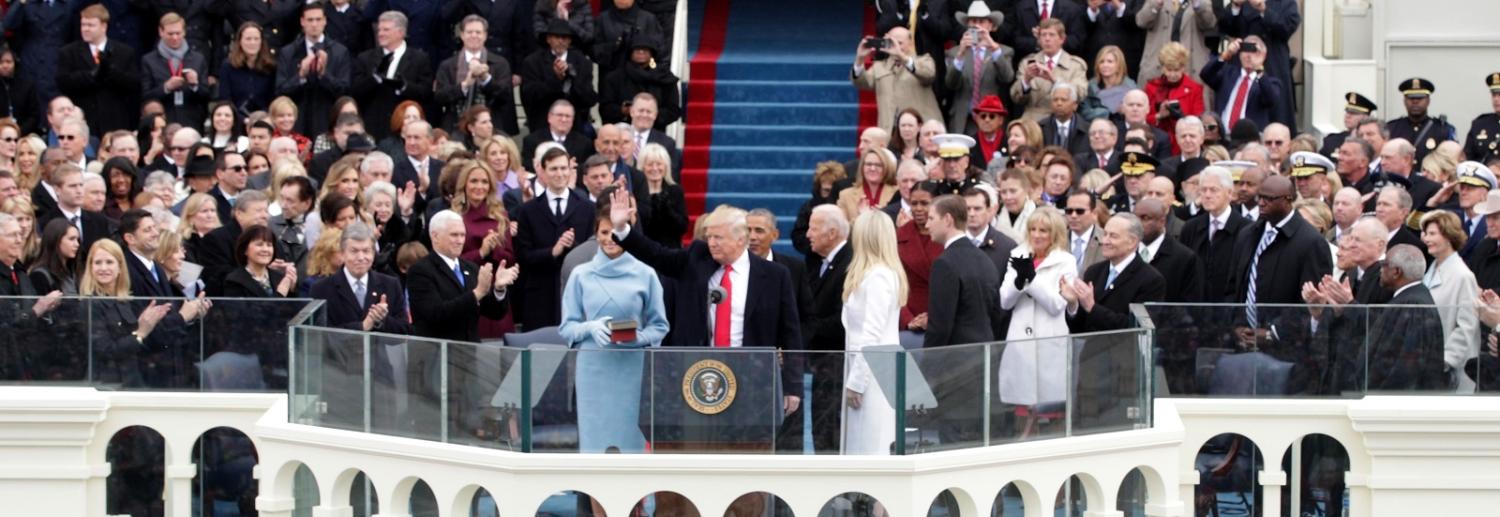When the heavens opened up and it started to rain just as President Donald J. Trump began his inaugural address, it was hard not to see it as an omen.
Barack Obama, a relentless optimist and dedicated globalist is gone, replaced by a neophyte populist politician whose promise to 'make America great again' is based on a deeply pessimistic view of the American status quo and the world order.
In his speech, Trump repeated many of the chauvinistic themes of his campaign, asserting, 'From this day forward, it’s going to be only America first'. But he advocated a protectionist stance that, if implemented, is likely to lower, not lift, all boats.
While Trump promised to 'reinforce old alliances and forge new ones,' his most memorable foreign policy pledge was 'to eradicate completely from the face of the earth' what he called 'radical Islamic terrorism.' Contrast this with President Obama’s offer in 2009 to reach out a hand to US Middle Eastern adversaries such as Iran 'if you are willing to unclench your fist'.
Indeed, Trump ended his speech by brandishing a fist – a curious and rather ominous gesture for the leader of the most powerful nation on earth.
Although Trump made numerous references to 'all Americans,' apart from Obama and his wife, Michelle, there were few black faces on the steps of the Capitol or in the audience on the national mall. Indeed, the lack of diversity at the festivities gave rise to a Twitter hashtag #inaugurationsowhite.
Trump’s attempt at minority outreach – a promise to violence-plagued inner cities that 'this American carnage stops right here and right now' – was more an echo of his flawed and dystopian view of black and brown America than a gesture of reconciliation. And while Trump invoked patriotism and the importance of unity, he did not explicitly ask the millions of people who voted against him to give him a second look and a chance to prove that he can be their president, too.
It is hard to underestimate the apprehension among those who opposed Trump and the special sense of dread in the nation’s capital.
Washingtonians voted overwhelmingly for Hillary Clinton, who stoically attended the inauguration of her rival along with her husband and other prior presidents and first ladies. Clinton, with her armies of think tank acolytes and deep bench of supporters from her husband’s and Obama’s administrations, would clearly have been ready on day one to govern the United States and interact with the rest of the world.
Trump, who despite his bravado did not expect to win, has scrambled since the 8 November election to put together a governing team. As of inauguration day, he had nominated only 30 of the 690 positions that need to be confirmed by the US Senate. Only two Cabinet officials – the secretaries of defense and homeland security – are expected to have won Senate approval by the end of today; the Trump team has been obliged to ask 50 senior Obama officials to remain on the job to insure that essential government bodies can continue to function.
Slogans aside, there is also very little clarity about what Trump will do in office. His nominees appear to disagree with him and with each other about issues as vital as the value of the NATO alliance, the chances for reconciliation with Russia and the size of the federal deficit. The fact that both houses of Congress have Republican majorities does not guarantee agreement on how to reshape the nation's health care system or taxation.
The new administration also takes office under continued legal clouds as investigations continue into possible links between members of the Trump campaign and Russia. Trump’s refusal to divest himself fully of his global business interests puts him in violation of the Emoluments Clause of the US Constitution, which forbids payments from foreign governments to US officials. Lawsuits against the president over this and other issues are likely to be a permanent and disruptive feature of his administration.
So too will public protests, beginning with rallies this week and a mega Women’s March on Washington tomorrow. Hundreds of thousands of people are expected to attend the march to reaffirm their support for abortion rights, minority rights, the rights of the disabled, gender equality, the environment and opposition to nuclear weapons among other progressive causes. These crowds will likely eclipse in size and fervor the Trump supporters at the inauguration. Aerial photographs depicted a sparsely filled national mall compared to the throngs that turned out for Obama’s inauguration in 2009.
As Americans ponder the future with fear, it is hard to reassure friends around the world that as Obama told his farewell news conference, 'Everything is going to be okay'.
Our new president has a lot to learn and has shown a limited capacity to evolve. Other champions of Western democracy – in and outside the US - may need to shoulder more of the burden for retaining a rules-based international order than they have ever had to in the past. May all of us be up to this challenge.
Photo by Alex Wong/Getty Images

